新视野第三版大学英语读写第三册Unit4教案
- 格式:doc
- 大小:88.29 KB
- 文档页数:7
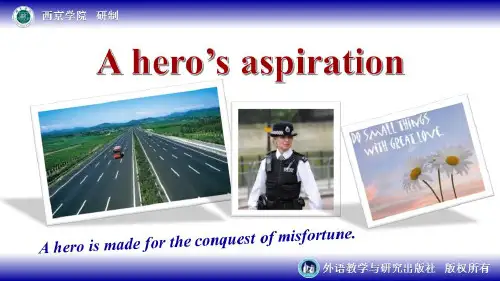

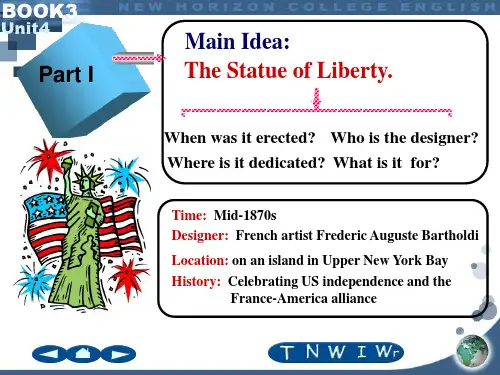
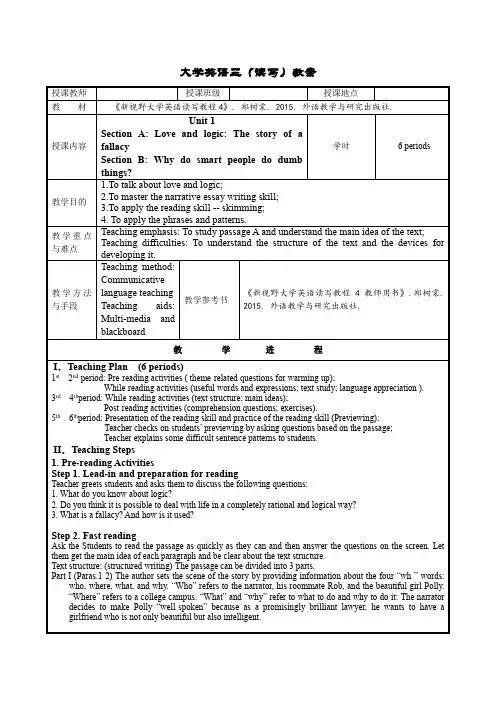
大学英语三(读写)教案Students are asked to read the passage carefully again and answer some detailed questions on the screen. During the reading, there is an explanation for the following points:Language Points:1.That year every guy on campus had a leather jacket, and Rob couldn’t stand the idea of being the onlyfootball player who didn’t, so he made a pact that he’d give me his girl in exchange for my jacket. (Para.1) Meaning: That year every young man in the college wore a leather jacket. Rob was the only one in the football team who didn’t have one. He felt frustrated whenever he thought about it, so he made an agreement with me that if I gave him my leather jacket, he would, as an exchange, give me his girlfriend.make a pact: 达成协议in exchange for: 作为(对... 的)交换2.If I could show the elite law firms I applied to that I had a radiant, well-spoken counterpart by my side, Ijust might edge past the competition. (Para. 2)Meaning: When looking for a job, if I could show the top law companies that I had a partner who was not only beautiful but also intelligent and polite, I might well be able to gain an advantage over mycompetitors and successfully get a job offer.3. “Radiant” she was already. I could dispense her enough pearls of wisdom to make her “well-spoken”.(Para. 3)Meaning: She was already very beautiful. And I could teach her to speak intelligently so that she would sound very pleasant and smart when she speaks.Meaning beyond words: The word “dispense”, which means “give sth. to people”, shows that the narrator regards himself far superior to the girl. He is again boasting and praising himself. The word shows hisarrogance and conceit.4.After a banner day out, I drove until we were situated under a big old oak tree on a hill off the expressway.(Para.4)Meaning: After spending an excellent day out with her, I drove my car to a hill by the highway. I stopped when we were under a big old oak tree.banner a. 极好的;非常成功的n. 横幅;横幅标语5.She seemed to have a good time. I could safely say my plan was underway. I took her home and set a datefor another conversation. (Para. 15)Meaning: It seemed that she had enjoyed my logic lesson very much. I was pretty sure that my plan was going on smoothly. I drove her home and decided on a date for our next meeting.underway 在进行中set a date for 为.....定日期 e.g. They will set a date for the wedding.6. “The situations are altogether different. You can’t make an analogy between them”. (Para.24)Meaning: The situations are totally different. You can’t make a comparison between them.Make/ draw an analogy between: 在.....之间作类比E.g. It is difficult to make an analogy between cars and airplanes. 把汽车和飞机进行类比是很难的。
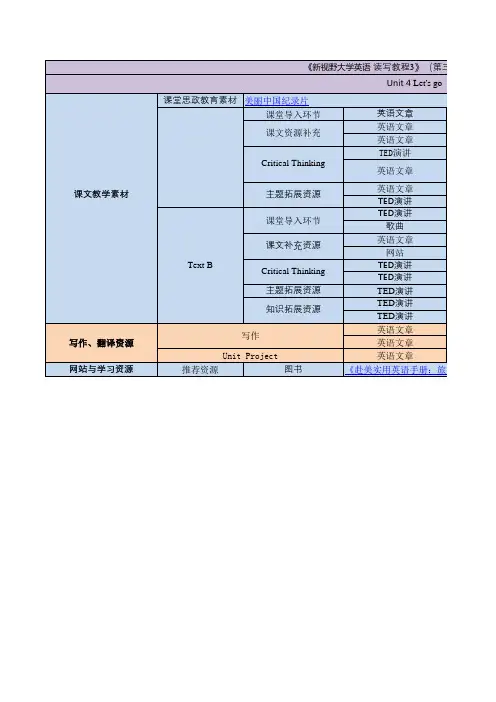
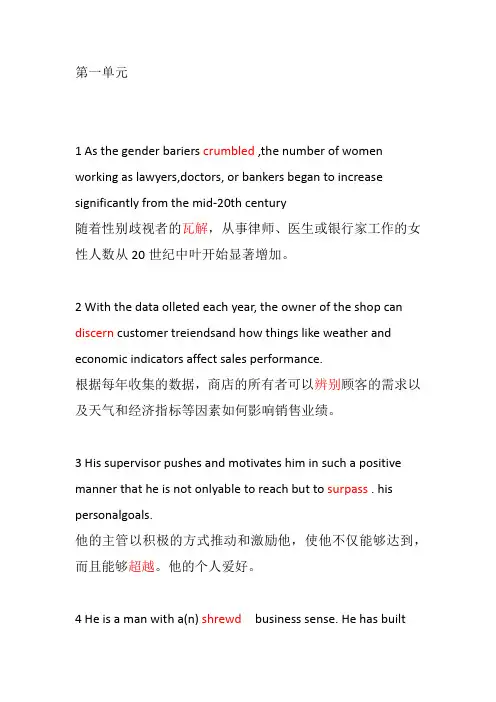
第一单元1 As the gender bariers crumbled ,the number of women working as lawyers,doctors, or bankers began to increase significantly from the mid-20th century随着性别歧视者的瓦解,从事律师、医生或银行家工作的女性人数从20世纪中叶开始显著增加。
2 With the data olleted each year, the owner of the shop can discern customer treiendsand how things like weather and economic indicators affect sales performance.根据每年收集的数据,商店的所有者可以辨别顾客的需求以及天气和经济指标等因素如何影响销售业绩。
3 His supervisor pushes and motivates him in such a positive manner that he is not onlyable to reach but to surpass . his personalgoals.他的主管以积极的方式推动和激励他,使他不仅能够达到,而且能够超越。
他的个人爱好。
4 He is a man with a(n) shrewd business sense. He has builthis initial investment into asubstantial and even excessively large fortune.他是一个有精明商业头脑的人。
他已经把最初的投资建立在一个绝对的甚至是巨额的财富上。
5 The conversion of nuclear radiation directly into electricity was an exciting possibilitythat was being vigorously explored in many .laboratories in the 1950s.直接将核辐射转化为电能是一种令人兴奋的可能性。
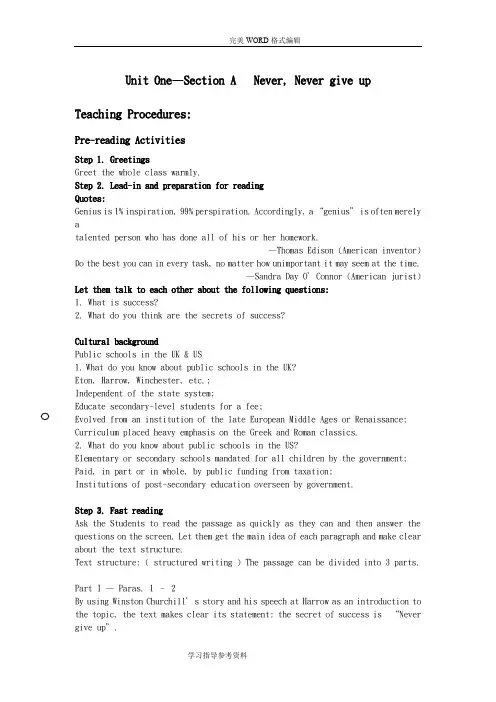
Unit One—Section A Never, Never give up Teaching Procedures:Pre-reading ActivitiesStep 1. GreetingsGreet the whole class warmly.Step 2. Lead-in and preparation for readingQuotes:Genius is 1% inspiration, 99% perspiration. Accordingly, a “genius” is often merely atalented person who has done all of his or her homework.—Thomas Edison (American inventor) Do the best you can in every task, no matter how unimportant it may seem at the time.—Sandra Day O’Connor (American jurist) Let them talk to each other about the following questions:1. What is success?2. What do you think are the secrets of success?Cultural backgroundPublic schools in the UK & US1.What do you know about public schools in the UK?Eton, Harrow, Winchester, etc.;Independent of the state system;Educate secondary-level students for a fee;Evolved from an institution of the late European Middle Ages or Renaissance; Curriculum placed heavy emphasis on the Greek and Roman classics.2. What do you know about public schools in the US?Elementary or secondary schools mandated for all children by the government; Paid, in part or in whole, by public funding from taxation;Institutions of post-secondary education overseen by government.Step 3. Fast readingAsk the Students to read the passage as quickly as they can and then answer the questions on the screen. Let them get the main idea of each paragraph and make clear about the text structure.Text structure: ( structured writing ) The passage can be divided into 3 parts.Part I — Paras. 1 – 2By using Winston Churchill’s story and his speech at Harrow as an introduction to the topic, the text makes clear its statement: the secret of success is “Never give up”.Part II — Paras. 3 – 7Through the examples of world famous scientists, statesman, and jurist, the text brings forward the statement that only those with a strong will, those who “keep their eyes on the prize”, and those who expend the substantial effort to keep going, will finally succeed.Part III — Para. 8By reinforcing the statement given in part II, the text draws the conclusion that with hard work, determination, dedication and preparation, you can transcend any handicap, accomplish any feat, and achieve success.Purpose: Improve the students’ reading and writing ability and understand the general idea of each paragraph.Method: Read the text individually and talk in groups; Use task-based language teaching method, reading approach, communicative approach and total physical response method.Step 4: While-reading ActivitiesStudents are required to look at the Words and Phrases on the screen and give a brief presentation in class.Words and Phrases:Purpose: Train the Stude nts’ ability of understandi ng and using foreign language.Method: Talk in groups, Use task-based language teaching method, communicative approach and total physical response method.Practical phrases1.deviate from …偏离,背离……有人生目标的人是永远不会偏离正确航向的。
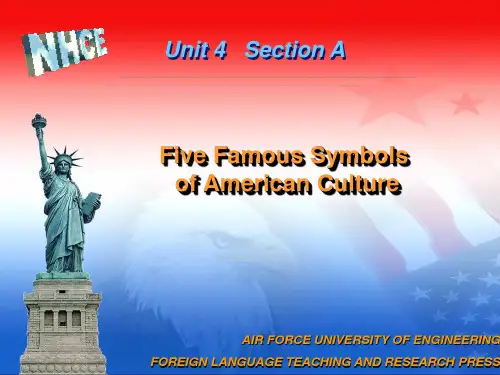
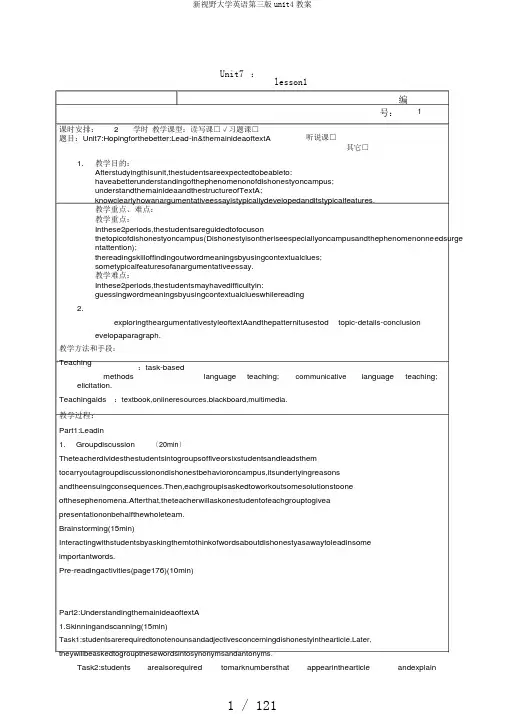
Unit7:lesson1编号:1课时安排:2学时教学课型:读写课□√习题课□题目:Unit7:Hopingforthebetter:Lead-in&themainideaoftextA听说课□其它□1.教学目的:Afterstudyingthisunit,thestudentsareexpectedtobeableto:haveabetterunderstandingofthephenomenonofdishonestyoncampus;understandthemainideaandthestructureofTextA;knowclearlyhowanargumentativeessayistypicallydevelopedanditstypicalfeatures.教学重点、难点:教学重点:Inthese2periods,thestudentsareguidedtofocusonthetopicofdishonestyoncampus(Dishonestyisontheriseespeciallyoncampusandthephenomenonneedsurge ntattention);thereadingskilloffindingoutwordmeaningsbyusingcontextualclues;sometypicalfeaturesofanargumentativeessay.教学难点:Inthese2periods,thestudentsmayhavedifficultyin:guessingwordmeaningsbyusingcontextualclueswhilereading2.exploringtheargumentativestyleoftextAandthepatternitusestodevelopaparagraph.topic-details-conclusion教学方法和手段:Teachingmethods :task-basedlanguage teaching;communicative language teaching;elicitation.Teachingaids:textbook,onlineresources,blackboard,multimedia.教学过程:Part1:Leadin1.Groupdiscussion〔20min〕Theteacherdividesthestudentsintogroupsoffiveorsixstudentsandleadsthem tocarryoutagroupdiscussionondishonestbehavioroncampus,itsunderlyingreasons andtheensuingconsequences.Then,eachgroupisaskedtoworkoutsomesolutionstoone ofthesephenomena.Afterthat,theteacherwillaskonestudentofeachgrouptogivea presentationonbehalfthewholeteam.Brainstorming(15min) Interactingwithstudentsbyaskingthemtothinkofwordsaboutdishonestyasawaytoleadinsome importantwords.Pre-readingactivities(page176)(10min)Part2:UnderstandingthemainideaoftextA1.Skinningandscanning(15min)Task1:ter, theywillbeaskedtogroupthesewordsintosynonymsandantonyms.Task2:students arealsorequired tomarknumbersthat appearinthearticle andexplainwhytheyareused.prehensionQs(page183)(15min)Part3Stylisticanalysis(15min)Concerning the writing style,t he students are guided to realize Text Ais an argumentative essay. Withregard toanargumentative essay, they shouldknowthewholetext centers onatopic andconcerning thetopic thewriter definitely hashis standpoint.Then concerningeachpartandeachparagraph,thestudentsareguidedtodiscoverthattheregenerallyisatopicsentence/statementsupportedbydetails(examplesinparticularinTextA)andaconcludingsentence/statement.板书设计:Unit7HopingforthebetterPart1.LeadinGroupdiscussionBrainstormingPre-readingactivitiesSkinningandscanningComprehensionQsPart3.Stylisticanalysis讨论、思考题、作业:PreviewthenewwordsandexpressionsoftextA;UtilizingtheinternetandgettoknowsomelifeexperiencesofAbrahamLincoln.Unit7:lesson2编号:2课时安排:2学时教学课型:读写课□√题目:Whenhonestydisappears:detailedstudyoftextA习题课□听说课□其它□教学目的:Afterstudyingthisunit,thestudentsareexpectedtobeableto:summarizethemainideaofTextA;understandthekeywords,phrases&expressions,andsentencestructures.教学重点、难点:教学重点:Inthese2periods,thestudentsareguidedtofocuson1.Keywords:eliminate;reveal;accurate;facilitate;exaggerate;imply;launch;frustrate;conscious;appropriate;expel;exemplify;extensive;awareness;etc.2.Phrases&expressions:launchacampaign;ifthis/thatisthe case;be confinedto;ripoff;descend to;turn in;copewith;nottomention;makeacomplaintaboutsth.;etc.3.Sentencestructures:Especially troubling/surprising/annoying are thereports/facts that.;Sth.,once hailedassth.,couldbecomesth.;Whetherdiscoveredornot(whetherconsciousorunconscious),sth.willdoaneffectonsth.;etc.教学难点:Inthese2periods,thestudentsmayhavedifficultyin:understandingthemainideaandstructureofTextA;; understandingandtranslatingsomecomplexsentences:教学方法和手段:Teaching methods:grammar translation teaching;communicative language teaching;elicitation.Teachingaids:textbook,onlineresources,blackboard,andmultimedia.教学过程:Part1Languagepoints(45min)Keywords:eliminatevt.1getridofsth.thatisnotwantedorneeded消除;剔除;铲除Wearetakingallmeasureswithinourpowertoeliminateviolence.我们正在采取我们力所能及的一切措施来消除暴力。
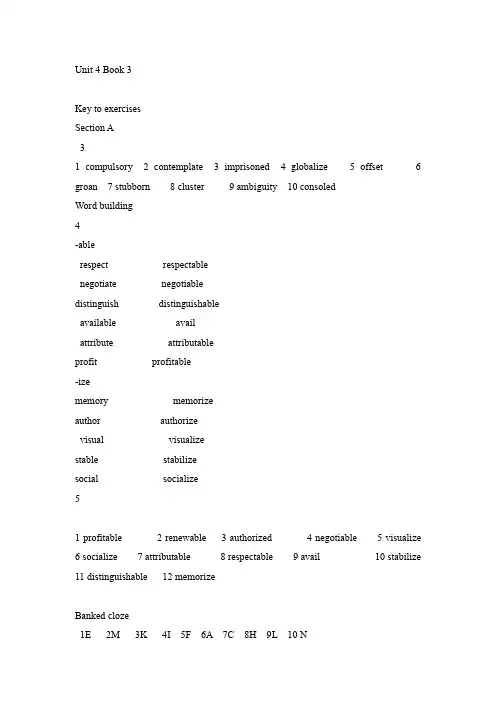
Unit 4 Book 3Key to exercisesSection A31 compulsory2 contemplate3 imprisoned4 globalize5 offset6 groan7 stubborn8 cluster9 ambiguity 10 consoledWord building4-ablerespect respectablenegotiate negotiabledistinguish distinguishableavailable availattribute attributableprofit profitable-izememory memorizeauthor authorizevisual visualizestable stabilizesocial socialize51 profitable2 renewable3 authorized4 negotiable5 visualize6 socialize7 attributable8 respectable9 avail 10 stabilize 11 distinguishable 12 memorizeBanked cloze1E 2M 3K 4I 5F 6A 7C 8H 9L 10 N7.1 settle for2 more often than not3 mingled with4 traded for5 was saturated with6 are open to7 endowed with8 make up for Structured Writing8Many parents set unreasonable expectations for their kids. Conflicts occur when their children fail to reach their expectations. But why do parents tend to expect so much from their children?The harsh reality may be one reason for the high expectations. We can see such logic behind parents' expectations: If their children can study hard, then they will be admitted to key universities, and then they will be much more competitive in job hunting after graduation.The peer pressure is also a contributing factor. Parents tend to compare their kids to other kids interms of academic performance. Parents consider it a shame if their children always lag behind other children. So it is often the case that parents spare no efforts to send their children to expensive training centers.Parents' love for their kids provides another explanation for their burning desire to see the best of their kids. Parents will be proud if their children make great achievements. But sometimes such love becomes a heavy burden on their kids.The harsh reality, peer pressure and parents' love all account for the unreasonable expectations for the kids. To set reasonable expectations for the kids is not easy, but is worth trying; after all, parents don't want the heavy pressure to crush their children.9威尼斯是意大利北部一座世界闻名的岛城:威尼斯建立于公元5世纪,在公元10世纪时成为一支重要的海上力量。
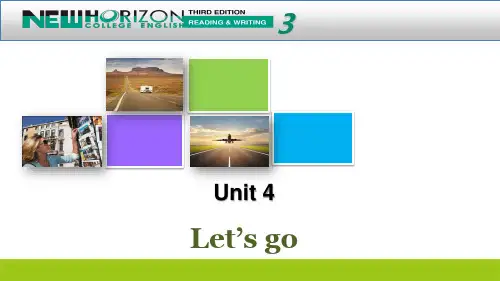
授课题目:Unit 4 The Surprising purpose of travel授课时间:第_____周授课类型:理论课授课时数:____课时教学目的:After finishing this unit, students will be able to:1.To practice speaking skills at a travel agency2.To foster students genre awareness and apply it to reading and writing3.To master the reading skill of looking for thesis statement4.To enable students to write an essay of causes on fixed topics by using a genre-based process-writing approach教学重点和难点:1.To talk about the surprising purpose of travel2.To understand the text fully3.To apply the phrases and patterns4.To master the cause-effect essay writing skill教学方法和手段:Various kinds of teaching methods are used:1.Teaching in class. Explain the profound theoretical knowledge in class;2.Case study. Provide case study during teaching, and make the students to discuss about the case;3.Bilingual and full English teaching;4.Learner-centered approach; situational & communicative method;5.Project-based approach教学内容和过程:Section A The surprising purpose of travelStep One Warming-up Activities 30 minutesI. Write as many words related to travel as you can•Varieties of travel•Means of transportation•Tourist attractions•Entertainment activities•Things to take•Where to stay•Other words about travelII. Lead-in questions:1.Do you like travelling? What are the reasons for you to travel?•To have a change•To experience something new and unfamiliar•To see the world and understand different culture•To marvel at the wonder of great nature•To escape from a boring lifestyle•To have a thorough relaxation•To broaden one’s horizons2.What’s your suggestion to a student who wants to have a trip but doesn’thave enough money for it?•Plan ahead•Find useful information•Travel in group•Go to a less-known place•Pack necessary thingsIII Background knowledge1.Where is Left Bank café? What features does it have?•The Left Bank café is located in the village of Saranac Lake on the Left Bank of the River Seine in Paris. It is a favorite meeting place of great artists, writers, and famous intellectuals since the early 20th century. LBC serves authentic French café-style food, including crêpes and tar tines, as well ascoffee, tea, wines and beers.2.What is Let’s Go? Give more information about it.• A world-renowned travel guide series, researched, written, edited, and run entirely by students at Harvard University.•It is claimed to be “the student travel guide” aimed at readers “both young and young at heart”.•Let’s Go was founded in 1960 and is headquartered in Cambridge, Massachusetts, the US. Office.3. What do you know about Machu Picchu?•An ancient ruined South American city high up in the Andes Mountains in Peru.•It was built by the Incas, a Native American people of South America, in about 1500 AD,•It has a temple of the sun and many other buildings.•It is a popular place for tourists to visit.Step Two Text Study 80 minutesI.Interactive reading of the text1. Reading comprehension1)Why does the author choose the word “burdensome” to describe hisimaginary travel? (Para. 1)2)What does the author mean by “the rest of the journey can feel like a tediousl esson in the ills of modernity? It sucks.”? (Para. 2)3)Suppose travel is troublesome and sometimes even unpleasant, why do wetravel according to the author? (Para. 2-4)4)What kind of travel is truly compulsory? (Para. 4)5)What is the irony when people travel to Paris trying to leave all thosetroubles behind? (Para. 5)6)What is the finding of the research? What does the author wants to prove byreferring to the example? (Para. 6)7)What do we need to do to trigger our creativity? (Para. 8)8)What are the secret cornerstones of creativity of travel?What will happen to usafter travel? (Para. 9)2. Structure of the textPart I Introduction (Paras. 1-4)The author gives us a vivid description of the imaginary travel experience, including how he struggles to get up in the early morning, how he gets to the flight gate after all trouble and how he finally gets stuck in the airport. The author puts forward a question: Why do we travel?Part II Body (Paras. 5-8)The author takes us to rethink the question: what is the real purpose of travel? Besides, she shares her own understanding of the real purpose of travel.Part III Concluding part (Para 9)We travel because we need to, because distance and difference are the secret cornerstones of creativity..3. Summary of the TextTravel is ___________ and sometimes even unpleasant; then what is the driving force behind our travel? We travel because we need to. Sometimes our travel is a ____ because we should attend the business luncheon, because we should celebrate Thanksgiving with our mom. We travel because we want to.Owing to the fact that most travel is _______, we just travel following our heart. Most people travel for the sake of __________, but their mind tends to solve the stubborn ___________ issues while on vacation. What is the real purpose of travel? Travelling to a new place can make us less controlled by familiar cognitive ________ that imprison us. As a result, we can better combine the new with the old, the mundane is ________ from a slightly more abstract perspective.To __________ travelers, multicultural contrast means that they are open to ambiguity and willing to see the world in different ways, thus to expand the ______________ of their “cognitive inputs” as they refuse to __________t heir first answers and initial guesses. Of course, that mental flexibility is a side effect of difference and we know what we did not know in the past, by which we become more open-minded and less _______.Apart from its advantages, travel also has it _________, which make us not take great pleasantness. More often than not, we need a _________ after our vacation. We travel because we need to, because distance and difference are the _____________of creativity. Travel will change our mind to some extent, which inturn can have ________on everything in our life.II. Language Focus: Words and expressions1. Key words:1)groan: (Para.1)vi. make a long low sound, e.g. because you are in pain or unhappy (因痛苦或烦恼等)呻吟,发出哼哼声The old man was groaning with pain.v. speak about sth. in a way that shows you are unhappy 抱怨She sat down beside me and groaned about her working day. 她坐在我身旁,抱怨自己整日辛劳。
授课题目:Unit 4 The Surprising purpose of travel授课时间:第_____周授课类型:理论课授课时数:____课时教学目的:After finishing this unit, students will be able to:1.To practice speaking skills at a travel agency2.To foster students genre awareness and apply it to reading and writing3.To master the reading skill of looking for thesis statement4.To enable students to write an essay of causes on fixed topics by usinga genre-based process-writing approach教学重点和难点:1.To talk about the surprising purpose of travel2.To understand the text fully3.To apply the phrases and patterns4.To master the cause-effect essay writing skill教学方法和手段:Various kinds of teaching methods are used:1.Teaching in class. Explain the profound theoretical knowledge in class;2.Case study. Provide case study during teaching, and make the students to discuss about the case;3.Bilingual and full English teaching;4.Learner-centered approach; situational & communicative method;5.Project-based approach教学内容和过程:Section A The surprising purpose of travel Step One Warming-up Activities 30 minutesI. Write as many words related to travel as you can•Varieties of travel•Means of transportation•Tourist attractions•Entertainment activities•Things to take•Where to stay•Other words about travelII. Lead-in questions:1.Do you like travelling? What are the reasons for you to travel?•To have a change•To experience something new and unfamiliar•To see the world and understand different culture•To marvel at the wonder of great nature•To escape from a boring lifestyle•To have a thorough relaxation•To broaden one’s horizons2.What’s your suggestion to a student who wants to have a trip butd oesn’t have enough money for it?•Plan ahead•Find useful information•Travel in group•Go to a less-known place•Pack necessary thingsIII Background knowledge1.Where is Left Bank café? What features does it have?•The Left Bank café is located in the village of Saranac Lake on the Left Bank of the River Seine in Paris. It is a favorite meeting place of great artists, writers, and famous intellectuals since the early 20th century.LBC serves authentic French café-style food, including crêpes and tartines, as well as coffee, tea, wines and beers.2.What is Let’s Go? Give more information about it.• A world-renowned travel guide series, researched, written, edited, and run entirely by students at Harvard University.•It is claimed to be “the student travel guide” aimed at readers “both young and young at heart”.•Let’s Go was founded in 1960 and is headquartered in Cambridge, Massachusetts, the US. Office.3. What do you know about Machu Picchu?•An ancient ruined South American city high up in the Andes Mountains in Peru.•It was built by the Incas, a Native American people of South America, in about 1500 AD,•It has a temple of the sun and many other buildings.•It is a popular place for tourists to visit.Step Two Text Study 80 minutesI.Interactive reading of the text1. Reading comprehension1)Why does the author choose the word “burdensome” to describe hisimaginary travel? (Para. 1)2)What does the author mean by “the rest of the journey can feel likea tedious lesson in the ill s of modernity? It sucks.”? (Para. 2)3)Suppose travel is troublesome and sometimes even unpleasant, whydo we travel according to the author? (Para. 2-4)4)What kind of travel is truly compulsory? (Para. 4)5)What is the irony when people travel to Paris trying to leave all thosetroubles behind? (Para. 5)6)What is the finding of the research? What does the author wants toprove by referring to the example? (Para. 6)7)What do we need to do to trigger our creativity? (Para. 8)8)What are the secret cornerstones of creativity of travel?What willhappen to us after travel? (Para. 9)2. Structure of the textPart I Introduction (Paras. 1-4)The author gives us a vivid description of the imaginary travel experience, including how he struggles to get up in the early morning, how he gets to the flight gate after all trouble and how he finally gets stuck in the airport. The author puts forward a question: Why do we travel?Part II Body (Paras. 5-8)The author takes us to rethink the question: what is the real purpose of travel? Besides, she shares her own understanding of the real purpose of travel. Part III Concluding part (Para 9)We travel because we need to, because distance and difference are the secret cornerstones of creativity..3. Summary of the TextTravel is ___________ and sometimes even unpleasant; then what is the driving force behind our travel? We travel because we need to. Sometimes our travel is a ____ because we should attend the business luncheon, because we should celebrate Thanksgiving with our mom. We travel because we want to.Owing to the fact that most travel is _______, we just travel following our heart. Most people travel for the sake of __________, but their mind tends to solve the stubborn ___________ issues while on vacation. What is the real purpose of travel? Travelling to a new place can make us less controlled by familiar cognitive ________ that imprison us. As a result, we can better combine the new with the old, the mundane is ________ from a slightly more abstract perspective.To __________ travelers, multicultural contrast means that they are open to ambiguity and willing to see the world in different ways, thus to expand the ______________ of their “cognitive inputs” as they refuse to __________their first answers and initial guesses. Of course, that mental flexibility is a side effect of difference and we know what we did not know in the past, by which we become more open-minded and less _______.Apart from its advantages, travel also has it _________, which make us not take great pleasantness. More often than not, we need a _________ afterour vacation. We travel because we need to, because distance and difference are the _____________of creativity. Travel will change our mind to some extent, which in turn can have ________on everything in our life.II. Language Focus: Words and expressions1. Key words:1)groan: (Para.1)vi. make a long low sound, e.g. because you are in pain or unhappy (因痛苦或烦恼等)呻吟,发出哼哼声The old man was groaning with pain.v. speak about sth. in a way that shows you are unhappy 抱怨She sat down beside me and groaned about her working day. 她坐在我身旁,抱怨自己整日辛劳。
Unit 4 Section A The surprising purpose of travel令人惊奇的旅行目的1 It's 4:15 in the morning, and my alarm clock has just stolen away a lovely dream. I almost return back to sleep before my eye catches my packed suitcase and I groan, remembering that I'm going to the airport. The taxi is late and then lost, and I'm getting increasingly nervous that I'll miss my flight. I run in when we arrive, stagger through security and finally get to my gate. After all the trouble of this morning, my flight is canceled and I'm stuck in this terminal for the next 218 minutes, and my only consolation is a cup of complimentary airport coffee. This is traveling, a burdensome series of running and waiting, and after countless hours, finally getting there.1 早晨四点一刻,闹钟把我从美梦中惊醒,要不是突然看见早已收拾好的行李箱,我几乎又要睡着。
想起来还要去机场,我叹了口气。
出租车来晚了,并且在途中迷了路,我越来越担心会赶不上飞机。
出租车一到机场我就冲进去,跌跌撞撞通过安检处,终于,我来到了登机口。
经历这一早所有的麻烦事,我乘坐的航班却被取消了。
在接下来的218 分钟里,我被困在了机场,唯一觉得安慰的是机场提供的一杯免费咖啡。
这就是旅行,让人心烦的跑跑停停。
最终,在不知经过多少小时之后,终于到达要去的地方。
1 It's 4:15 in the morning, and my alarm clock has just stolen away a lovely dream. (Para. 1) Meaning: It's 4:15 in the morning and my alarm clock has just woken me up from a lovely dream. Note: In Paragraph 1, present tenses are used to describe a scene which is not actually happening and to make the imaginary scene seem more immediate and more real.2 I run in when we arrive, stagger through security and finally get to my gate. (Para. 1)Meaning: I run in after we arrive, walk unsteadily through security and get to the place where I should get on the plane.Note: The word gate here means "the place at the airport where people get on a plane".3 … I'm stuck in this terminal for the next 218 minutes, and my only consolation is a cup of complimentary airport coffee. (Para. 1)Meaning: … I am trapped in this ter minal for the next 218 minutes and my only comfort is a free cup of coffee offered by the airport.Note: The author used 218 minutes instead of 3 hours and 38 minutes in order to emphasize the trouble of waiting for a long time.4 This is traveling, a burdensome series of running and waiting, and after countless hours, finally getting there. (Para. 1)Meaning: Traveling means we have to spend countless hours running and waiting before we finally get to the destination, which is quite troublesome.2 Why do we travel? I don't mind the actual flying, the wonder of being airborne in a dense metal bird. The rest of the journey, however, can feel like a tedious lesson in the ills of modernity, from the predawn x‐ray screening to the sad airport malls selling clusters of keepsakes. It's the result ofa globalized world, and it sucks.2 我们为什么要旅行?其实,我并不介意飞行本身,在这样一个密实的金属大鸟中飞行,让我感到很奇妙。
然而,旅程其余的部分,从一大早X 光检查到出售大堆纪念品的糟糕的机场商场,感觉就像是关于现代社会弊病的乏味课程。
这是全球化的结果,它糟糕透了。
5 I don't mind the actual flying, the wonder of being airborne in a dense metal bird. (Para. 2) Meaning: I don't mind the flying itself as it is a great wonder that the plane, like a heavy metal bird, can fly in the sky.6 The rest of the journey, however, can feel like a tedious lesson in the ills of modernity, from the predawn x-ray screening to the sad airport malls selling clusters of keepsakes. (Para. 2) Meaning: But the rest of the journey is very boring. You have to endure and tolerate the problems and difficulties brought by modernity, such as going through the x-ray screening early in the morning and wandering around the terrible airport shopping departments selling various keepsakes.Note: The word ills means "problems and difficulties", and screening literally means "tests done to check someone for a particular disease", here x-ray screening means "the process of testing passengers and their luggage for possible dangers". The word keepsake means "a small object that you keep in order to remind you of something or someone".7 It's the result of a globalized world, and it sucks. (Para. 2)Meaning: It is the result of globalization, and that's too bad and very annoying.Note: Here, suck means "be very bad, very annoying, etc." This is used only in the present tense.3 Sometimes, of course, we travel because we need to. Because in this digital age, there is still something important about the handshake at a business luncheon. Or eating mom's special food on Thanksgiving. Or seeing your girlfriend on your 2‐year anniversary.3 当然,有时候我们旅行是因为我们需要去旅行。